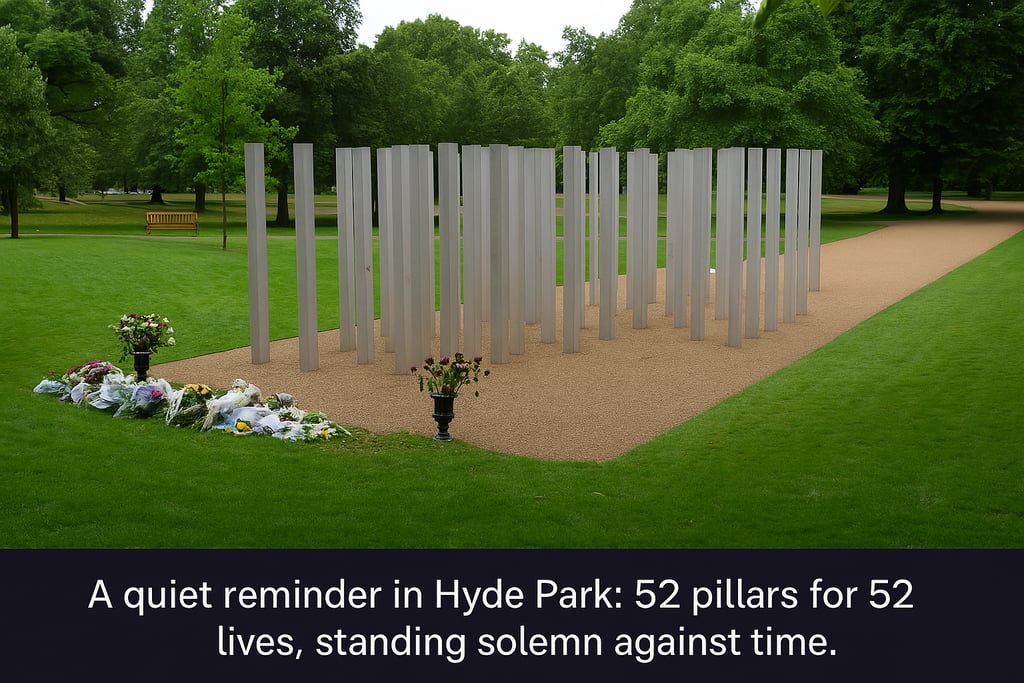Going to Work to Honour the Victims of 7/7
We will not forget the victims and survivors of the London bombings on 7 July 2005
Paul Carter
7/19/20255 min read


On 7 July 2005 I was sat in my Vauxhall office. I liked to start early, even though I hated my job. It took three years of bouncing between temp jobs and unemployment until I secured a permanent office job, earning less than almost everyone I knew. I was a month away from starting my job as a press officer.
My priority was to sell my ticket for the Queen concert in Hyde Park that evening. Then I heard about the “power surges” on London's public transport during the morning rush hour. Slowly but surely, the news dropped.
Three tubes and a bus sounds like a nightmare journey to work. For the 52 dead and the 700 injured, it was. Aldgate Station, Edgware Road, King’s Cross/Russell Square and Tavistock Square. Bombed.
After being fascinated by 9/11, I was living on the margins of the London bombings. It must have been chaos, but I did not know that at the time. There was no TV in the office and you were not supposed to surf the web during working hours. I did not know the capital was under attack. I did not know if the concert would be cancelled. I emailed the buyer to ask if she still wanted the Queen ticket, waiting for the hammer to fall on the exchange.
In 2005 I was under the power of OCD, praying that my new press officer job starting in August would distract me from the intrusive thoughts that dragged me into a dark hole every day. The unfolding news story about the London bombings gave me something else to think about. Who are the bombers? How many people are dead? They were just on their way to work; why did they have to die? Am I in an episode of 24? What would Jack Bauer do?
The Queen concert was cancelled. Waterloo East was busy as people piled on to the trains to get home and not let hate win. A day after London found out it would be hosting the 2012 Olympics.
Life continued for me as the nation struggled to distinguish 7/7 from 7/11 or was it 7/5 because it happened in July 2005. I remember being annoyed that people were more upset about Brexit than innocent people getting blown up, or maybe the two are not connected and talking about one atrocity does not mean you have to talk about them all. Other people can talk about the tragedies they care about.
For the 20th anniversary of the London terrorist attacks I watched, listened and read about it to prove I cared equally about 7/7 and 9/11. The Rest Is Classified episode 1 of Terror Strikes London: 7/7 spoke about the importance of not fixating solely on the attackers themselves. I concur as while the investigation about the bombings, international terrorism and the manhunt for the 21/7 failed bombers make good television, I wanted to know about the survivors and the families of the deceased.
‘At 26 years old you think you’re indestructible,’ said Dan Biddle, who was stuck in an unsolicited staring contest with one of the suicide bombers on the Circle Line. He was about to ask him what he was staring at when his world changed forever. He lost both legs, an eye, his spleen and suffered extensive internal injuries. ‘You become fixated on the things you’ll never do,’ he said in the Netflix documentary Attack on London – Hunting the 7/7 Bombers. I was a year younger that Dan at 25 and while I finished university, I shared his fears about the future, but I had not been blown up.
‘You could hear people crying, screaming in pain,’ said another survivor who was an ex-military medic and used his belt as a tourniquet to stem the bleeding from Dan’s leg. The witness testimonies bring home the horror of what it was like on the train, the track and the tunnel.
The walk through the Aldgate tube tunnel to relative safety was described as ‘a weird, sombre, zombie-esque walk.’ The news footage shows journalists you have not seen for years and journalists who are still around now when they were twenty years younger. If it bleeds, it leads, but what happened and why? This was before smart phones and social media made everything instant and on-demand. Even emergency responder radios did not work underground.
I harboured ambitions of being a journalist in 2005 and could not wait to become a press officer to confirm my suspicions I did not have the talent to be a journalist. ‘In London you can lose your identity and be anybody you want to be,’ said a survivor in BBC’s 7/7: One Day in London. That’s the best and worst thing about London as you discover you can only be yourself and who you want to be changes as each year passes.
Like all tragedies, there were people who caught an earlier train than usual or a man who advised his wife to get on the Tavistock Square bus to beat the queues. This BBC documentary was my favourite as it focused on people sharing their stories to explain what happened, to talk for those who can’t. ‘I remember hearing screams’, ‘the blast seemed to go on forever’, ‘I woke up and found myself lying on the train track’, ‘there was limbs, you could see parts of people’s arms’, ‘I haven’t finished the job I’m doing as a mother’, ‘sometimes you can’t even find the words to describe what went on down there.’
If the suicide bombers attacked the Greenwich to Waterloo line, it could have been me.
‘How fragile our sense of safety is,’ commented the former prime minister Tony Blair. It was good to hear from the man in charge, although he could not compare with those who can talk unguarded. ‘Everything was just black and white, and the only thing that was in colour was the blood,’ said one survivor. A fireman at the scene remembered seeing survivors in their pants and socks because the blast blew off their clothes.
A survivor remembers being carried up the stairs from the tube tunnel and his rescuers saying, ‘Why do we always get the heavy one?’ Not a great time to crack a joke and gallows humour cannot always be justified. Maybe you had to be there to understand the joke.
One of the victims, Stan Brewster designed the Torrs millennium walkway, a footpath along the River Goyt. His son who was 17 when his dad died spoke poignantly and could almost be an amalgamation of all adults who lost a parent too soon. Like a scene from a rite-of-passage TV series that pulls at your heart strings.
There are too many stories to mention including survivors struggling with the fact they survived but the person next to them didn’t. ‘Unless you’ve had a family member blown up in a terrorist attack, you can’t even imagine how it feels,’ said a bereaved relative. That is true. What we can do is watch, listen and read to let them know they are heard and will not be forgotten.
When I went on a Rotary Study Exchange to North Carolina I gave a family I was staying with a pack of London tube cards as a gift. I discovered their daughter was on the tube that day. She was not near the bombs but it must have been terrifying.
My way of honouring the 7/7 victims and survivors is to not complain about commuting to work, to deal with setbacks in my career without acting like a victim of a mass tragedy and do everything I can to make the world of work a better place.
Inspiration
What we talk about when we are working and living
© 2025. All rights reserved.
